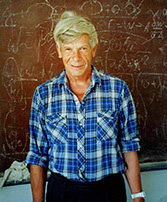Speaker
Description
We study a self-organized critical system under the influence of turbulent motion of the environment. The model addresses two unusual scaling regimes (types of critical behaviour) predicted by the field-theoretic renormalization group analysis for a self-organized critical system with turbulent motion of the environment. The system is modelled by the anisotropic stochastic equation for a running sandpile'' introduced by Hwa and Kardar in [{\it Phys. Rev. Lett.} {\bf 62}: 1813 (1989)]. The turbulent motion is described by the isotropic Kazantsev-Kraichnanrapid-change'' velocity ensemble for an incompressible fluid. The original Hwa-Kardar equation allows for independent scaling of the spatial coordinates $x_{\parallel}$ (the coordinate along the preferred dimension) and ${\bf x_{\bot}}$ (the coordinates in the orthogonal subspace to the preferred direction) that becomes impossible once the isotropic velocity ensemble is coupled to the equation. However, it is found that one of the regimes of the system's critical behaviour (the one where the isotropic turbulent motion is irrelevant) recovers the anisotropic scaling through dimensional transmutation.'' The latter manifests as a dimensionless ratio acquiring nontrivial canonical dimension. The critical regime where both the velocity ensemble and the nonlinearity of the Hwa-Kardar equation are relevant simultaneously is also characterized byatypical'' scaling. While the ordinary scaling with fixed IR irrelevant parameters is impossible in this regime, the ``restricted'' scaling where the times, the coordinates, and the dimensionless ratio are scaled becomes possible. This result brings to mind scaling hypotheses modifications for systems with significantly different characteristic scales.

